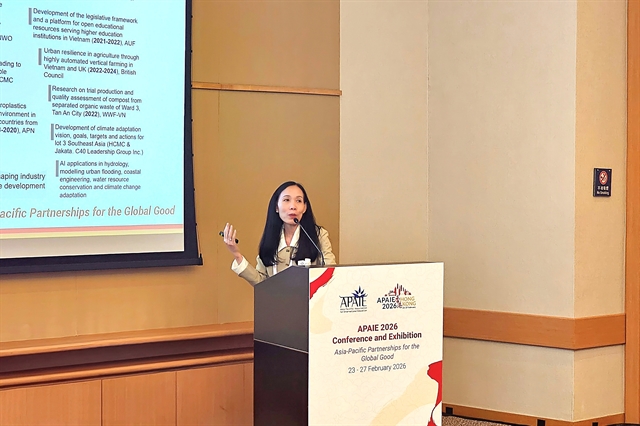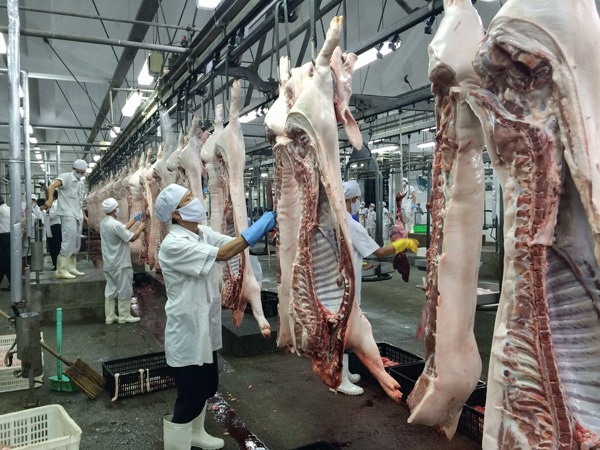 Society
Society

Traditional slaughterhouses in HCM City must either close down or modernise their facilities and relocate to outlying districts by the end of the year, Vũ Văn Hoan, the spokesman for HCM City People’s Committee, has said.
 |
| A modern slaughterhouse in HCM City’s Củ Chi District. — VNS File Photo |
HCM CITY — Traditional slaughterhouses in HCM City must either close down or modernise their facilities and relocate to outlying districts by the end of the year, Vũ Văn Hoan, the spokesman for HCM City People’s Committee, has said.
Hoan last week asked district authorities and relevant agencies to create favourable conditions for investors to open modern slaughterhouses, saying that the city wanted to ensure food safety, from rearing of animals and growing of plants to processing and transportation.
“Traditional slaughterhouses which cannot ensure food safety must be closed down or relocated,” said Hoan, adding that investors of large-scale abattoirs should speed up construction of modern slaughterhouses.
He said HCM City authorities had worked with government agencies from neighbouring provinces to prepare for temporary suspension of Xuyên Á, the biggest abattoir in the city.
HCM City and neighbouring provinces will also support traders and collaborate with slaughterhouses from these provinces to ensure full pork supply for HCM City.
“The city will never approve any proposal made by enterprises and agencies to temporarily allow the operations of traditional slaughterhouses,” Hoan said.
On November 12, the operators of several modern abattoirs criticised the city for permitting the operation of a slaughterhouse owned by Hóc Môn Food Processing JSC. The slaughterhouse is not considered a modern facility.
A number of slaughterhouse operators criticised the city’s move to allow operation of the company’s slaughterhouse, saying the city’s Department of Agriculture and Rural Development had been “inconsistent” in its policies on the development of modern abattoirs.
However, Hoan said the company had only made a proposal to the city, and that continued operation of the slaughterhouse was not a decision made by the city’s People’s Committee.
After these complaints, the city Department of Agriculture and Rural Development announced that it would not accept traditional slaughterhouses in the city.
Bạch Đăng Quang, head of Tân Hiệp Co.op in Hóc Môn District, said the city should provide support to help companies build modern abattoirs rather than help them restore traditional slaughterhouses.
A manager of a slaughterhouse company said: “As a management agency, the city’s Department of Agriculture and Rural Development should provide full support to projects of building and opening modern slaughterhouses.”
Suspension
All traditional slaughterhouses in the city must stop operation by the end of the year or open modern abattoirs in outlying districts, as part of a plan to develop the animal and poultry industry from 2016 to 2020 (with a vision to 2025) approved by the HCM City People’s Committee.
Seven modern slaughterhouses will be built in the near future, including five plants in Củ Chi District and two in Hóc Môn District.
According to the Department of Agriculture and Rural Development, companies have faced difficulties in opening modern slaughterhouses because of paperwork required for land-use rights and construction licences. Construction of the projects cannot be completed on schedule.
Investors of the projects said the delays were caused by paperwork needed at the departments of Town Planning and Architecture, Mineral Resources and Environment, Planning and Investment, and Agriculture and Rural Development, and the city’s Taxation Bureau.
Four modern slaughterhouses are expected to open in the first quarter of next year, with total capacity of 8,000 domestic animals per day.
The agriculture department has proposed completing these slaughterhouses by the end of the first quarter in 2018. — VNS




